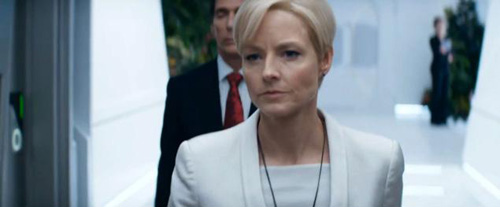Good science fiction movies owe a great deal to their predecessors. For example, H.G. Wells created the “dying Earth” genre for humankind’s future in his classic novel The Time Machine way back in 1895. In Wells’ vision of a future Earth, mankind had evolved into the elegant, surface-dwelling Eloi and the prole-like, underground-living Morlocks.
In writer/director Neil Blomkamp’s new sci-fi film Elysium, the future date is 2154 and a revolving space station like the one that orbited Earth in Stanley Kubrick’s 2001 has been transformed into the ultimate gated community—a verdant, modernistic, luxurious upper-class city called Elysium (using real-life locations in neighborhoods in Vancouver and the wealthy section of Mexico City). The affluent have moved to live in the sky because the world’s surface is polluted and overpopulated with everyone barely surviving. (The immense, real-life garbage dump outside Mexico City served as a major location for filming the movie.)
Blomkamp reunited with several of the crew who created his District 9 film, including film editor Julian Clarke, cinematographer Trent Opaloch, production designer Phillip Ivey and the special effects gurus at Industrial Light and Magic. The result is a film that looks and feels very real.
The story line is familiar. We first meet the two Spanish-speaking youngsters Max and Frey in a Los Angeles orphanage. Although she is older, the kids become good friends who make a secret pact to escape to Elysium where everyone is happy, healthy and wise. This healthy aspect is augmented by in-home devices called Medi Pods that look like tanning beds but use molecular reconstruction to cure everything from pimples to broken bones to a face blown off by a hand grenade.
We later meet Max (Matt Damon) and Frey (Alice Braga) as grown-ups. He is now a parolee imprisoned numerous times for car theft and violent anti-social behavior, and she is now a nurse. The pair reunites in a hospital emergency room when she puts a cast on his broken arm—inflicted on Max by the robot cops who frisked him, threw him to the ground and smashed his arm with a mechanical baton.
Max is one of the only 2 percent of people who live in his neighborhood who have a job—on the assembly line for the company that makes the robotic cops and all the security devices that keep the millions of needy surface dwellers off of Elysium. Once the robots are assembled, Max wheels them into an enclosed chamber for irradiation. When the door to the chamber gets stuck, Max is sent inside by his supervisor to correct the problem. The door closes, the irradiation process starts and suddenly Max has only five days to live—unless he can get to Elysium and get cured.
But that is just the story. What makes Elysium worthwhile are all the details. When Max reports to his parole officer it is a seated robot with the face of a tin toy that lacks the ability to identify nuances in human speech. “Was that sarcasm?” the parole officer asks Max. Since sarcasm automatically adds additional time to your parole, Max insists in a very neutral voice that his comments are “just statements of fact.”
Languages people use are obviously linked to status. Most of LA’s residents speak Spanish among themselves and English with authority figures. The powerful, cold-fish do anything to make sure Elysium is protected. Secretary Delacorte (Jodi Foster) is in charge of Security. She is the head of the Civil Cooperation Bureau, speaks French at cocktail parties and English with the mercenary undercover agent Kruger (Sharlito Copley) she controls on Earth. It is Kruger who Delacorte secretly commands to launch surface-to-air missiles to destroy the three vessels headed to Elysium with illegal immigrants onboard. That way, Elysium looks blameless (sort of a throwback to the old TV show Mission Impossible, where the disguised agents were told upfront, “The Secretary will disavow any knowledge of your actions”).
See? In sci-fi, everything old is new again.
Comments? E-mail gi*********@co*****.net.
58.1
F
Healdsburg
April 20, 2025








